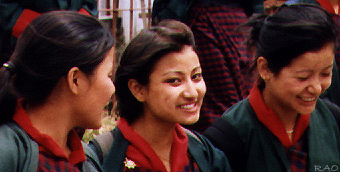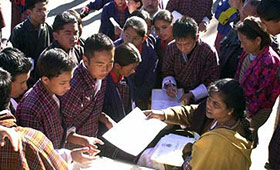 |
Bhutan's
Education |
|
|
 |
|
New
English curriculum
|

|
 |
With
the standard of English perceived to be generally poor in the schools
a new English curriculum will be introduced in Classes IX and XI from
February, 2006, academic year to improve the reading and writing skills
of Bhutanese students.
|
|
The
essence of the change is that students will be taught to develop skills
in reading and writing, listening and speaking, grammar and language.
In
the past experts say that it was mainly listening, which means that only
the teacher spoke, and other skills were neglected.
"They
end up memorising what is in the book and interpreting it in the same way
as the teacher," said one teacher. "Developing the skills would enable
students to read and understand and interpret it on their own."
The
new curriculum will specify the number of periods for each skill and will
require students to fulfill specific objectives set in the curriculum framework.
"The curriculum framework will explain how students should read and write
and what kind of understanding they should reach at the end of each level,"
said the education secretary, Dr. Pema Thinley.
To
know the level of development of their skills, students will be tested
on parallel learning materials and not on materials present in the syllabus.
A
guidebook for teachers has been developed to outline the way teachers should
work and the syllabus will use only "relevant materials", explained Lhundup
Drukpa, project officer of Strengthening Support to Education in Bhutan
(SSEB), as a good balance between non-fiction and fiction, and classical
and contemporary literature.
Literature
written by Bhutanese writers, in English, are included in the syllabus
for different classes along with selected work by writers from other countries.
The aim is to expose youth to "Bhutanese literature and thinking".
The
new curriculum will be introduced in other classes over the next few years,
education officials said.
Education
officials said they believed that the development of "tools subjects"
- English, Mathematics and Dzongkha - would lead to the overall improvement
of the quality of education.
They
said that English would be the most effective one because it was the medium
in which most of the subjects were taught.
"The
general notion is that competency level of people in English is not high
and it should be improved," said Dr. Pema Thinley.
"Graduates
from both high schools and colleges are not able to communicate in this
language, cannot keep the minutes of meetings properly, and cannot do their
reports."
| English
teachers said that they did not know whether the problem was in the teaching-learning
process at the primary level but they agreed that the standard of reading
and writing was low.
. |
|
 |
The
education secretary said that it was the same with Mathematics and Dzongkha
for which a new curricula was also being developed.
Officials
said that the improvement in quality would not happen overnight but would
take time
Meanwhile
about 75 middle and higher secondary English teachers are attending
an orientation workshop in Thimphu to be introduced to the new curriculum.
 |
| The
new curriculum was jointly developed by relevant officials from the Bhutan
Board of Education, Education Monitoring Support Service Division, Education
Media Service, Canadian Cooperation Office, CASPD, SSEB and teachers and
lecturers from schools and Sherubtse College including two professors from
the University of New Brunswick, Canada. |
|
According
to officials, experts studied the cause of falling standards in the country
and identified that language skills, lack of child-centered and child friendly
teaching-learning process and materials, and low professional knowledge
of teachers were some of the most urgent problems that had to be addressed.
The
new term will apply to all schools in the country with an exception of
those in the high altitude areas. For schools in Laya, Lingshi, and Lunana,
school starts in April and will continue until mid-November. Schools in
Merak and Sakten will begin by middle of March and close in mid-November.
| Contributed
by Kinley Wangmo, KUENSEL, Bhutan's national newspaper, 2005 |
 |
top
|
Links |
 |
 |
 |
External
links |
|






